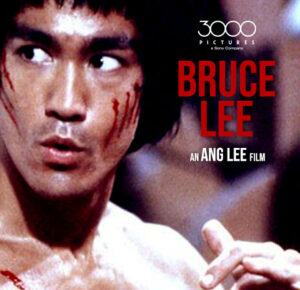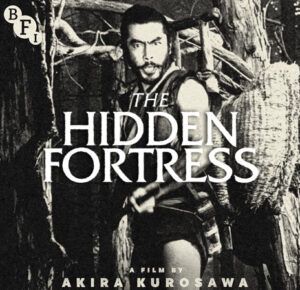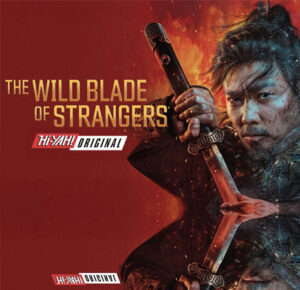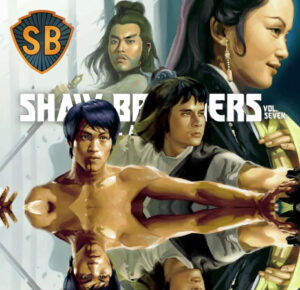
"The Hero of Swallow" Chinese DVD Cover
Director: Siu Sang
Writer: Siu Sang Studio
Producer: Cheung Chung Ping, Hu Chin, Allen Lan Hai Han
Cast: Yuen Biao, Athena Chu Yan, Eddie Ko Hung, Lily Chung Suk Wai, Ma Chung Tak, Elvis Tsui Kam Kong, Yvonne Yung Hung, Allen Lan Hai Han
Running Time: 96 min.
By JJ Hatfield
“The Hero Of Swallow” is set in pre – WWII China. There is a tremendous amount of misery caused by the Japanese invasion and the “Swallow” lives a nomadic rob the rich – give to the poor code. He also has another reason for traveling so much. The motivation to go to Beijing was mostly to look for his sister who was abducted and sold into prostitution. He has taken a vow to never stop looking until he finds and rescues her.
The Swallow is Li San (Yuen Biao) He is searching for Ching Li /Chinny (Athena Chu Yin). However his robberies have not gone unnoticed. His name comes from the fact that he can leap such great distances he seems to almost fly. Not only is he in danger for his stealing from the wealthy but he is being set up to be a thief caught in the act of virtual treason.
When we first see Li San in action he is dressed in his robbing attire, a rather ninja type affair. It’s unfortunate it is at night because he pulls off some great moves but it’s hard to see much of anything! I have seen two different copies and both are too dark in the first big fight scene as well as other visuals. Swallow wins of course and frees many girls but doesn’t find Ching Li.
Li San/Swallow has a police investigator following him, Captain Tang Yue Chi. (Ma Chung Tak) who is not as easily fooled as most of the police. After a particularly daring theft of a rare antique
the Japanese are after Swallow as well.
His only friends are a young pickpocket who pretends to be a guy but is a girl. (No it is not at all convincing just like in all those other movies) and a disabled war veteran (Tsui Kam Kong) that was once helped by Li San/Swallow. Biao wanders all over the place mixing with the bad guys and no one figures it out.
LiSan/Swallow also discovers corruption and machinations of cut throat business owners, a villain who will not stop until he has stopped – and he is trained in the same school technique. The places for him to hide while searching for Ching Li/Chinny are dwindling. No matter what happens there is going to be a big fight. How can it be resolved without someone dying?
Neither the soundtrack nor the visuals help raise the level above mediocre. Just when you think think, “Ok now we’ll see Biao do his stuff” – he doesn’t. Or it is one or two moves. I can only assume filming was done in the dark to perhaps hide all the wires, except those you could actually make out at times.
I personally take issue with the two-part ending. It isn’t the number of acts or parts – it is the ending itself. It felt rushed, muddled and then who gives a f#ck. Obviously no one had a clue as how to wrap up the movie. Which shouldn’t be too surprising since no one had any idea how to film the movie. The ending left several things unresolved and then went on for what felt like hours to the point you want to yell at your TV screen “We get the frickin’ point!”
This film has problems. There are a few moments of cool fights but much of it is literally hard to see in the dark. That might be a blessing though at least you don’t see Biao swinging from wires. This is not used as wire assisted to make hits and kicks look a little rougher I mean like jumping from the ground to second story roofs. Even that would be acceptable if done well, but who knows it’s impossible to see!
When Biao is not in fighting mode he seems to be confused at to what the hell is going on. He is not alone. The viewer may experience a similar sensation. The script was apparently changed …well more than once. Actors would come and go for roles. Funding was difficult to arrange. The primary shooting was done in a rural China village not for effect, but to prevent having to spend money. It actually provided for some scenic backdrops but they were supposed to be in Beijing.
I’ve yet to find a version I can recommend. None are even decent in quality especially visually. There may be a re-master somewhere I am not aware of yet. The worst copy comes courtesy of Mei ah. If you enjoy watching movies with your eyes 1 3/4“ from the screen this is the movie for you! It’s so frickin’ dark. The subtitles also require watching extremely close. They are burned in, double subtitles, one on top of the other. When you are able to see anything the movie is grainy, skips here and there…..etc.
Considering the quality of many Yuen Biao films just skip this one. Check out “Prodigal Son”, “Project A” and “Righting Wrongs”. You will thank me later.
JJ Hatfield’s Rating: 3.5/10
By Numskull
It’s December the 24th, and whereas under most circumstances I would be standing on the roof, merrily dumping cauldrons full of boiling oil onto unwary Christmas carolers, I happen to be in a pissy mode right now due to a throat infection which makes my voice sound like that of a laryngitic toad and makes it impossible for me to go more than two minutes without coughing, so I’m just gonna stay indoors and tell you about this remarkable film I saw called The Hero of Swallow (how ironic is that? With this throat infection, it kinda hurts to swallow. Ain’t that a bitch?).
It’s not remarkable because it’s particularly good or bad, but because I couldn’t help but notice some rather…no, make that VERY distinct similarities between it and the highly regarded Crouching Tiger, Hidden Dragon. I won’t be satisfied with just saying “yeah, some of the shots are similar, so the fuck what” so I’m afraid I shall have to discuss this issue in some detail before talking about Hero of Swallow in and of itself (aside from a mandatory plot summary). Henceforth the abbreviations HOS and CTHD will be used for the two films in question (you guess which is which). I will assume that you, dear reader, are already familiar with CTHD and that I may forego a certain amount of description for that film without losing you.
HOS follows the exploits of Li San, a.k.a. Hero Swallow (Yuen Biao), a Chinese Robin Hood type (no comparisons to Iron Monkey, please…there’ll be enough comparing going on here soon enough) who dresses in an all black, ninja style suit, steals stuff from rich people, and gives money to those in need. He is particularly attentive to women sold into forced prostitution since his own sweetheart, Chinny (Athene Chu) was kidnapped and raped by some rich guy, then sold off to God knows who. Yuen Biao leaps…well, flies, actually, thanks to the miracle of wires…from rooftop to rooftop in a way which will no doubt recall Zhang Ziyi’s nocturnal antics in CTHD. A finger cannot be placed squarely on any one particular “theft” shot or sequence in HOS which has a direct parallel in CTHD, but the overall look and feel of Yuen Biao’s night prowling is something that Ang Lee obviously sought to emulate in his film. It only looks better in CTHD because you can’t see the wires.
HOS’s first fight scene starts almost immediately and will give first-time viewers a distinct feeling of “Aw shit, this looks like it’s gonna be one of those old Lo Wei Jackie Chan movies” (this is not the case, as you will later see). Yuen Biao beats up a few guys and then concentrates on one guy. The first battle in CTHD takes place about 20 minutes into the film, so at the very least, Ang Lee didn’t swipe HOS’s sense of pacing, and while Zhang Ziyi and Michelle Yeoh give each other a serious workout, with Michelle generally getting the better of her young adversary by a slim margin, Yuen Biao’s opponents provide considerably less competition. Additionally, when Yuen climbs walls in HOS, and when others do the same to try and catch him, the “scampering” movements and camera angles are undeniably similar to those displayed by Michelle Yeoh while she’s chasing Zhang Ziyi around in CTHD, and that sense that the wall isn’t even being touched is also present.
HOS also features a fight scene with Yuen Biao and his foe clinging to treetops. It looked goofy as hell in CTHD and it looks goofy as hell here, but this scene is much shorter than its more well-known counterpart (thank God).
This stuff really is small potatoes for the most part, but I haven’t told you about the best (?) part yet. Without a doubt, the biggest smoking gun in favor of the argument that CTHD plagiarizes HOS is the wedding procession scene. No rational human being can possibly deny that the two scenes share unmistakable similarities. Here’s how it works in HOS: Li San’s lost love Chinny used to be the star attraction of the whorehouse she was staying at. But, she caught some rich guy’s eye and he buys her from the whorehouse to make her his wife. Yuen Biao, naturally, is displeased by this news and sends his disciple (Yuen Biao’s Disciple = YBD) to throw a monkey wrench (I was SO tempted to put “Iron monkey wrench” there…lame, lame, lame) into the rich guy’s plan. So, before the ceremony, there’s a big parade and Chinny gets carried down the street in a palanquin (that’s that thingie the bride rides in). The sequence of events here goes like this:
INSIDE THE PALANQUIN: Chinny is shown, dressed all in red, with her head lowered. She’s wearing a big hat which conceals her face from us.
OUTSIDE THE PALANQUIN: YBD shows up and starts beating up parade people, loudly announcing that this wedding must not take place.
INSIDE: Chinny hears the commotion and looks up in surprise.
OUTSIDE: YBD fights off more guards and shouts a message to Chinny (“Li San is here for you,” etc.) and takes off.
Sound familiar?
Of course, this description is pretty vague. A picture, however, is worth a thousand words, and if they were Siu Sang’s, I imagine a good number of them would be very choice words indeed for Mr. Ang Lee. Anyone who watches HOS’s wedding procession scene and says that CTHD’s bears no similarities is a fool, a liar, or both. That is not my opinion…it is a FACT.
I could go on, looking at the whole damn thing frame by frame for CTHD blueprint material, but that would be a waste of both your time and mine. I mean, I could REALLY be a nit-picker and point out the fact that Yuen Biao executes a jumping sort-of-splits kick, hitting two guys at once, much like the one Zhang Ziyi performs on the desert bandits, but I hardly think that HOS and CTHD are the only two martial arts films ever to display such a maneuver. So where do we go from here? Hell, I dunno. Is Ang Lee guilty of plagiarism? Yes. I know he has said that CTHD was a sort of homage to the kung fu movies he loved as a kid, but HOS is from 1996, at which point I think it’s safe to say he was no longer a “kid”. Of course, movies in the same genre are going to have similarities, but when THIS MANY “similarities” are shared by two films, one of which came after the other, the line between good-natured imitation and flat-out theft has been crossed. But what if it wasn’t Lee’s doing? What if cinematographer Peter Pau is to blame? That’s possible, I guess…and if that’s the case, then he doesn’t deserve that Oscar…but I’m more inclined to believe it’s Ang Lee’s doing (by the way, before you say “What if…”, the cinematographers for HOS were Wong Wing Fei and Ho Hak Wai…so no, Peter Pau did not simply do the same thing in two different films). What about the screenplay, then? The CTHD script had several writers, Ang Lee not among them, and was based on a book (which, by the way, I still can’t believe nobody has yet translated into English and released in North America to capitalize on the success of the film). Let us not forget that the screenplay is what dictates what needs to be shot. It doesn’t dictate camera angles, however, and that department is the biggest offender here.
How much of a stink should be raised over this? That’s not for me to decide. If I had five minutes alone with Michelle Yeoh or Zhang Ziyi, I would definitely make a point of asking them if they’d ever seen or heard of this film…I’m curious as hell about that. But how much good would it do? Would Hero of Swallow get a re-release with new text on the back of the package saying “acknowledged as a major source of inspiration for the smash hit Crouching Tiger, Hidden Dragon” or something like that? Would Entertainment Weekly do a half-page mini-story on it with corresponding still photos from both films, ending with “Sony Pictures Classics representatives declined to comment”? Would Chow Yun-Fat get pissed off about being suckered into starring in a cut-and-paste film and perforate Ang Lee with a pair of .45 automatics? Or would the whole thing just be totally ignored by those less enlightened than us? That last option would be my guess. Do we keep this juicy knowledge a relative secret…or do we piss in the wind with everything we’ve got?
What I wanna know is, what goes through filmmakers’ minds when they pull shit like this? Do they think, “Oh, man, if anyone sees how much I stole from this movie I’m good and fucked” or “Ah screw it, I’ll copy this and this and this all from the same movie, if somebody finds out, big deal” or “If I get asked about this I’ll close my eyes and put my fingers in my ears and say ‘la la la la I am not listening’ and wait for them to go away” or what? Ang Lee had to figure on someone associated with HOS seeing CTHD and noticing the similarities. Did he arrange for Sony Pictures Classics to buy the silence of those people…or just plain silence them? (Hello, Oliver Stone? I have a conspiracy theory you haven’t made into a movie yet.)
One question that begs to be answered: is HOS a better film than CTHD? Hell no. Not even close. I kinda hate to say that, but the best thing about CTHD in my opinion has nothing to do with Ang Lee’s questionable filmmaking, and that’s Yuen Wo Ping’s justly esteemed fight choreography. I don’t mind telling you that I don’t give two shits about how much Li Mu Bai and Shu Lien secretly long for each other, or how often Lo whacked off after Jen Yu took off with nothing for him to remember her by except for some silly-ass comb (you know, the one she spent an hour and a half trying to get back, then decided to let him keep). The fight scenes in HOS are nothing to sneeze at, but they aren’t that special, either. Some of you will be pleased to know, however, that they’re refreshingly wire-free.
To be honest, I’m not sure why Ang Lee chose to swipe so much stuff from this movie. In many ways it’s a substandard chop socky adventure, with a script full of inanity, melodrama aplenty, and a depressingly small array of mistimed sound effects. He must have done it since HOS was presumably seen by very few people (after all, it stars Yuen Biao…Mr. Underrated, remember?). At least he (Lee) was smart enough not to copy the scenes where Hero Swallow escapes from prison by inexplicably squeezing through the gaps between the bars, which are clearly far too narrow to accommodate him (we just see his clothes flying from one side of the bars to the other). Even worse, there’s one instance where a still shot of Yuen’s head is shown shrinking, passing between bars, then expanding back to its normal size. If you thought special effects like this went out with the ’70s, think again.
SPOILER PARAGRAPH: HOS takes a turn for the worse away from the tried and true kung fu movie path as the conclusion draws near. A final showdown between Yuen Biao and Eddy Ko is set up beautifully…then gets cut agonizingly short. The cops finally nab Hero Swallow, and the final scene has him being paraded through the congested streets, almost as a Christ-like figure, while onlookers throw stuff and weep (mixed crowd). This goes on for longer than Yuen got to duke it out with Eddy. I’m all for tragic endings as long as they’re done well, but this just sucks. It doesn’t bring a tear to your eye or take your breath away with its emotional impact…it just pisses you off. Come to think of it, there’s another thing CTHD has in common with HOS…an unsatisfying ending. You can’t convince me that most people didn’t want to see a climactic duel to the death between Li Mu Bai and Jade Fox, as opposed to that lame poison needle shit.
That’s about it, I guess. Looks like I spent more time and energy discussing CTHD’s debt to HOS than I did on HOS in and of itself. Well, so be it…there’s not much to say about it, really. Mindless CTHD fanboys who want to tell me I’m full of shit and that Ang Lee is a creative genius are encouraged to kiss my ass; anyone else who has something to say to me, go ahead and say it. In the meantime, I’ll be pouring glass after glass of water down my swollen throat, partly to help fight this damn infection and partly to get rid of the foul taste that this whole mess has left in my mouth.
Bah. Humbug.
Numskull’s Rating: 5/10






















Be the 1st to Comment